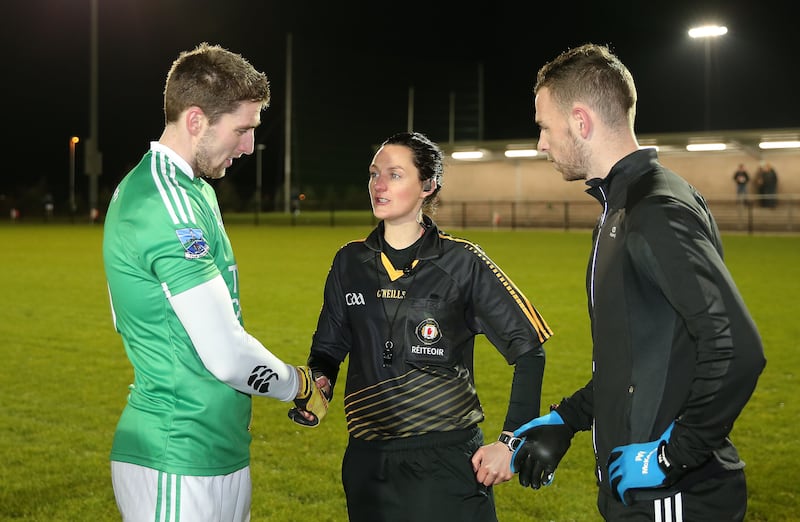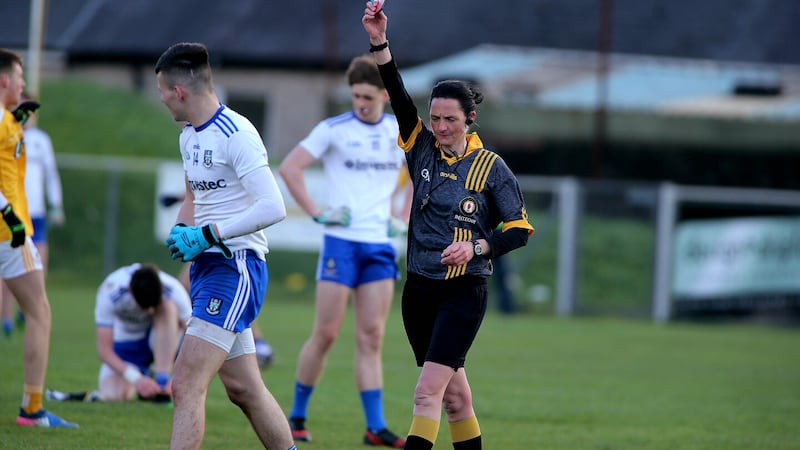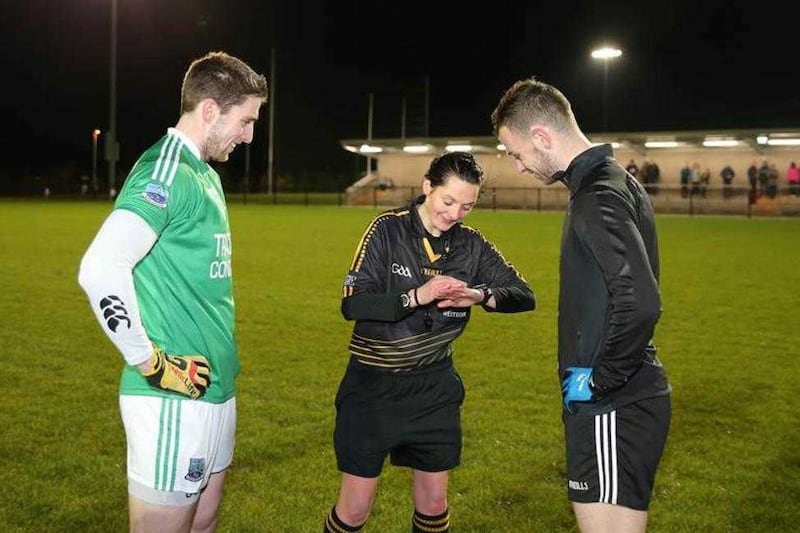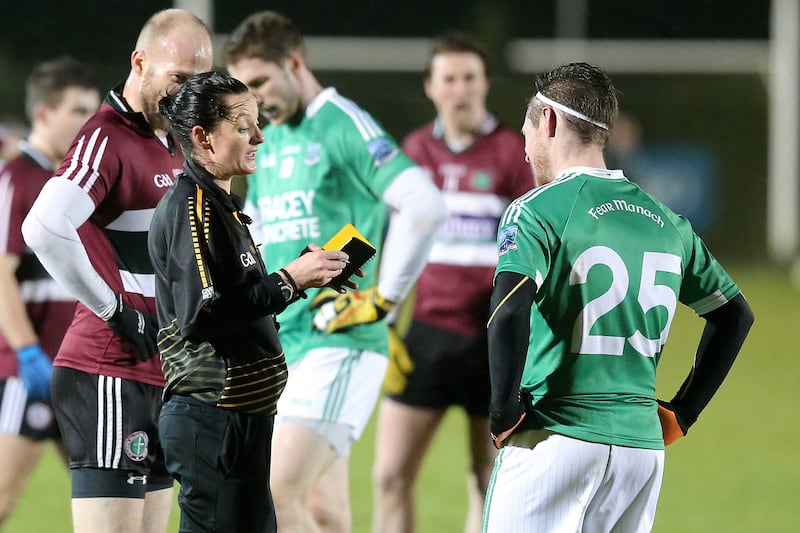IT’S the “mad men and mad women” at children’s games who are the biggest source of abuse for GAA referees, says trail-blazing Cavan official Maggie Farrelly.
Laragh United clubwoman Farrelly – who has taken charge of three ladies’ All-Ireland finals and hopes to be the first woman to referee the men’s final too – says ill-informed, irate spectators at underage games are the worst offenders when it comes to criticising officials.
“There’s no question about it,” said Farrelly who remains the only woman to have taken charge of a senior men’s inter-county game.
“Most of the abuse occurs within that underage structure. The silent sidelines doesn’t happen, you see parents going absolutely baloobas on the sideline - inappropriately going absolutely crackers.
“It’s not knowing the rules that leads to their frustration and taking the opportunity to hit out. You see mad men and mad women going bonkers along the line for no reason because they feel the referee is wrong.”
Farrelly was on the National referees’ panel this year and acted as the sideline official for the dramatic Tyrone versus Monaghan Ulster Championship quarter-final in Omagh. Totally committed to GAA, she doesn’t ‘do’ social media, she rarely watches television and alongside her refereeing she continues to play for her club.
After failing a fitness test, experienced former All-Ireland final whistler David Coldrick was released from the elite referees’ list recently. Farrelly didn’t make the referees’ Championship panel but she will keep pushing hard until she does and her vigorous training regime means she is one of the fittest on the circuit.
“I’m up every morning at quarter past five before work,” she explains.
“I start work (in sport development for the Donegal Sports Partnership) at 8am and finish at 4pm and if I’m training with my club in the evening time I head off to that as well.
“On these bright mornings I can get out on the pitch, otherwise I’m in the gym. I enjoy the whole physical fitness aspect. I’m mostly running on the road or doing a pitch session because I think it’s very important that you’re able to apply yourself on the pitch as well – when you’re refereeing on a pitch you have to acclimatise to it.”
Her refereeing journey began when the Cavan County Board threatened to introduce a law penalising clubs who didn’t have an active referee on their books. Laragh United chairman Thomas McKenna approached Farrelly and she agreed to put her name forward.
She began by refereeing at underage level and progressed to adult games and was then invited to the Ulster referees’ academy. She’s been a fully-fledged referee for 10 years’ now and in 2015 made her senior county debut when she took charge of Fermanagh versus St Mary’s McKenna Cup game. Since then she has refereed at National League level and her other ground-breaking firsts include the Cavan men’s county final between Gowna and Ramor.

Every time she goes out on the pitch she does so with a sense of pride that she has been selected and entrusted with the whistle.
“A committee has assigned you to a role, whether that’s refereeing the game or running the line or as sideline official, you’ve been entrusted on merit to do that job and you want to perform as best as you possibly can,” says Farrelly.
“Nobody ever goes out to have a poor performance so you’re going out with the mindset that you’re going to do the best thing that you can do in any given situation.
“Sometimes that doesn’t work out but the most important thing is how you deal with that and the attitude you have in relation to that.”
Throwing the ball in at Croke Park for the Sam Maguire decider is her ultimate ambition.
“I think it’s everybody’s ambition once you get to this level,” she says.
“You’d like to put yourself out there to be in that position. It’s like everything else, you’re not just going to sit at a plateau and think: ‘This is it, this is my dream here’ when everybody wants to be out in Croke Park refereeing an All-Ireland final.
“Whether it comes to me or not I don’t know. Of the 39 referees that are on the panel, some have accomplished that and my fellow Cavan referee Joe McQuillan has done it on four occasions so the aspirations are there for everybody.”
And you can guess what the worst part is of refereeing is. Farrelly and her colleagues are often damned if they do and damned if they don’t and there can be non-stop criticism of their decisions from dugouts and stands.
“You’ll never win an Allstar for being a referee,” says Farrelly.
“Everybody in the stands will find some sort of criticism of the person that’s running about with the whistle. I’ve never been nominated for an Allstar for being a referee and I don’t think any other referee has been either.
“It’s a very hard job and very challenging and nobody would ever put themselves out there to feel that they were just going to be abused for 60-70 minutes. You don’t go out with that mindset. You go out to do the best job you possibly can.
“You are there on merit to referee the game and the 60-70,000 people who are sitting in the stands watching you and giving their opinion of your decisions… You don’t see too many of them running about with a whistle in their mouth.”
GAA President Larry McCarthy recently voiced his concerns that referee numbers are dwindling and there does often appear to be an anti-referee tradition in the GAA. Some of the criticism is relatively harmless, some certainly crosses the line and Farrelly says the culture needs to change.
“At home our manager is a club player and he represented Cavan Over-40s and he said under no circumstances would he ever, ever go out to referee a game,” she said.
“That’s down to the fact of the amount of abuse that referees do get. That’s the unfortunate part about it.
“We all have the experts sitting in the stand just ready to ridicule somebody and probably the most frustrating part of it is that they don’t actually know the rule themselves. They are abusing somebody for something that they’ve done and they’re not sure of the rule themselves.
“I’m on the same level (for criticism) as my male counterparts and why would I be treated any differently? I do feel that there is an enormous amount of respect for officials on any match particularly at inter-county level.
“Everybody isn’t going to agree with your decision but if you can explain what your decision is for (it helps) the communication piece is hugely important and from player-to-referee it’s important. If a player asks you a question: ‘What’s that for ref?’ There’s no harm in turning around and saying: ‘I felt you had a hold of him and you weren’t letting go so you left me with no choice’.”
Having refereed at elite LGFA and club level and in the National League, the next step for Farrelly is to be handed the whistle for a men’s provincial Championship match. Progression as a referee can sometimes be slow and frustrating and the Cavan woman says she needs to “patient and resilient” as she bides her time for her breakthrough opportunity.
“I’m the first woman but at the end of the day I’m a referee, I do the same rules’ test, the same fitness test as my male counterparts and I’m treated no differently,” she says.
“I was on the National Panel last year and I’m grateful for that and I was on the National Panel this year but to be on the Championship Panel is very different and it is very difficult to break into after less than two years’ on the National Panel.”
She is constantly trying to improve her skills. Agonising over calls she might have got wrong isn’t her way but every day with the whistle is a learning day.
“It’s always about the next 60 or 70 minutes that you have to go to referee,” she says.
“You need to have the composure to focus on the game ahead and not be thinking back about what has happened. Obviously you give yourself time to reflect and watch it (the previous game) back on video and make some notes on what you could have done differently because that’s what learning is all about.
“I’m not saying that you go out and make mistakes just to learn but if something has happened you can learn from it.
“It’s knowing when to park it. If you’ve made a decision and on reflection you feel: ‘I could have done that differently’ then there’s your learning and you move on from there.”








